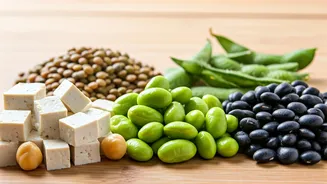Protein Power for Vegans
For vegetarians, particularly those with sensitive stomachs, ensuring sufficient protein intake can be tricky. It's important to select sources that are
both high in protein and easy to digest. Common sources of protein, such as beans and certain vegetables, can sometimes cause bloating or gas, making it difficult to reach your daily protein goals. Moreover, protein is vital for various bodily functions, including muscle repair, enzyme production, and overall health maintenance. It is essential to choose protein options that minimize digestive distress to facilitate optimal nutrient absorption and sustain energy levels. This guide will explore five suitable protein options for vegetarians, keeping sensitive stomachs in mind.
Tofu: The Versatile Choice
Tofu, made from soybeans, is a versatile, protein-packed option for vegetarians. It is a complete protein, meaning it contains all nine essential amino acids that your body needs but cannot produce on its own. Moreover, tofu is known for its mild flavor, which allows it to absorb the flavors of other ingredients in a dish. This adaptability makes tofu suitable for a wide variety of meals, from stir-fries to smoothies. Furthermore, it is relatively low in fat and calories, making it an excellent choice for those watching their weight. Tofu is also easily digestible compared to some other soy products like edamame, reducing the likelihood of bloating. Try different textures like silken tofu in smoothies or firm tofu in stir-fries.
Tempeh: A Fermented Favorite
Tempeh, another soy-based product, differs from tofu because it’s made from fermented soybeans. This fermentation process increases the digestibility of the soybeans, making tempeh a gentler option for those with sensitive stomachs. Also, tempeh boasts a nutty flavor and a firm texture, making it an excellent alternative to meat in various dishes. Tempeh is also a complete protein and contains prebiotics, which are beneficial for gut health. This combination of high protein, ease of digestion, and gut-friendly probiotics makes tempeh a great choice. You can grill, bake, or steam tempeh, then add it to salads, sandwiches, or curries.
Lentils: The Legume Option
Lentils are a nutritional powerhouse packed with protein, fiber, and various vitamins and minerals. Compared to other legumes, lentils are typically easier to digest, especially when properly prepared. Soaking lentils before cooking can further reduce any potential digestive issues. These small but mighty legumes are also incredibly versatile; you can add them to soups, stews, salads, and even use them as a meat substitute in dishes like lentil loaf or shepherd's pie. Lentils come in various colors, each with its own subtle flavor profile. You can opt for brown, green, red, or yellow lentils, ensuring variety in your meals.
Quinoa: The Ancient Grain
Quinoa, often considered a grain, is actually a seed that is a complete protein. This means it contains all nine essential amino acids. It is gluten-free and easily digestible for most people, making it an excellent choice for those with sensitive stomachs. Also, quinoa cooks quickly and can be used in a variety of dishes. You can use it as a base for salads, a side dish, or in breakfast bowls. Quinoa's mild flavor also pairs well with various vegetables, herbs, and spices. In addition, quinoa is also a good source of fiber, which helps promote healthy digestion. So, this further supports its suitability for people with sensitive digestive systems.
Chia Seeds: Tiny Powerhouses
Chia seeds are tiny, nutrient-dense seeds that pack a significant protein punch, along with a host of other health benefits. They are rich in fiber, which helps promote healthy digestion and can prevent constipation. However, it's essential to increase your fiber intake gradually to avoid bloating. Soaking chia seeds before consumption can make them even easier to digest. Chia seeds are incredibly versatile, as you can add them to smoothies, yogurt, oatmeal, or even use them to make chia seed pudding. Moreover, they have a neutral taste, so they won't alter the flavor of your meals. The combination of protein, fiber, and ease of use makes chia seeds an excellent addition to a vegetarian diet, especially for those with sensitive stomachs.



















